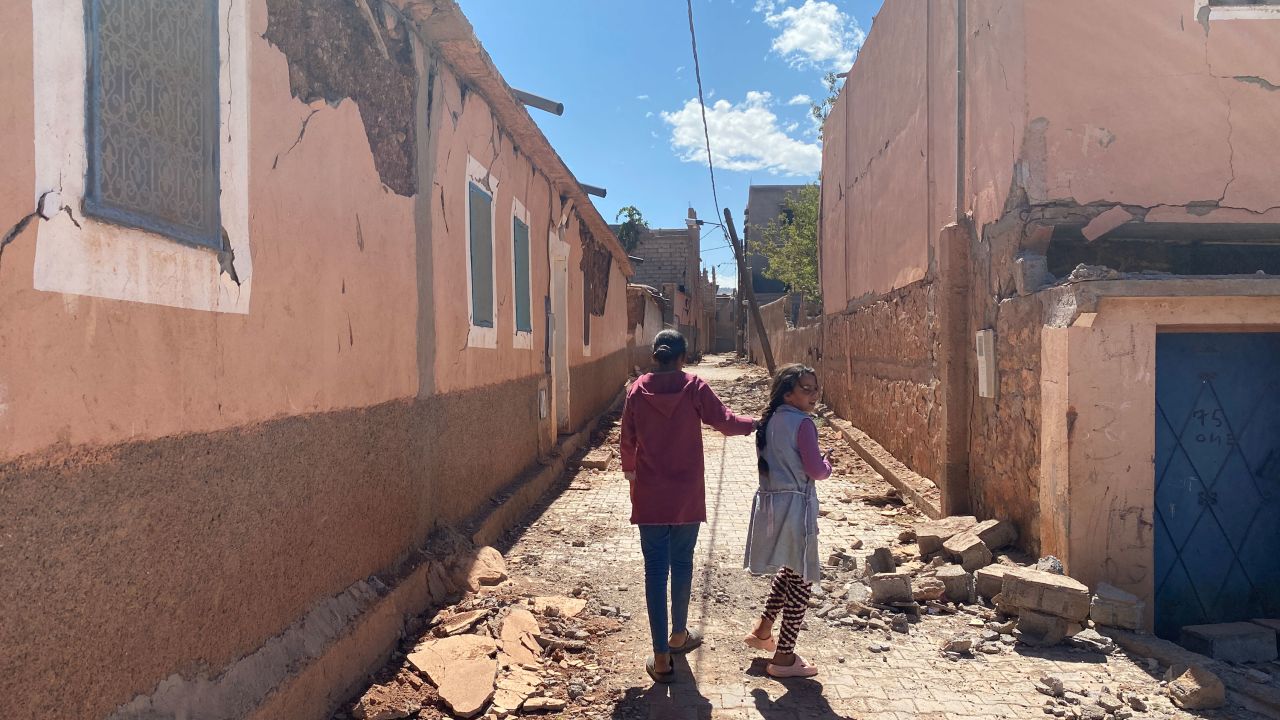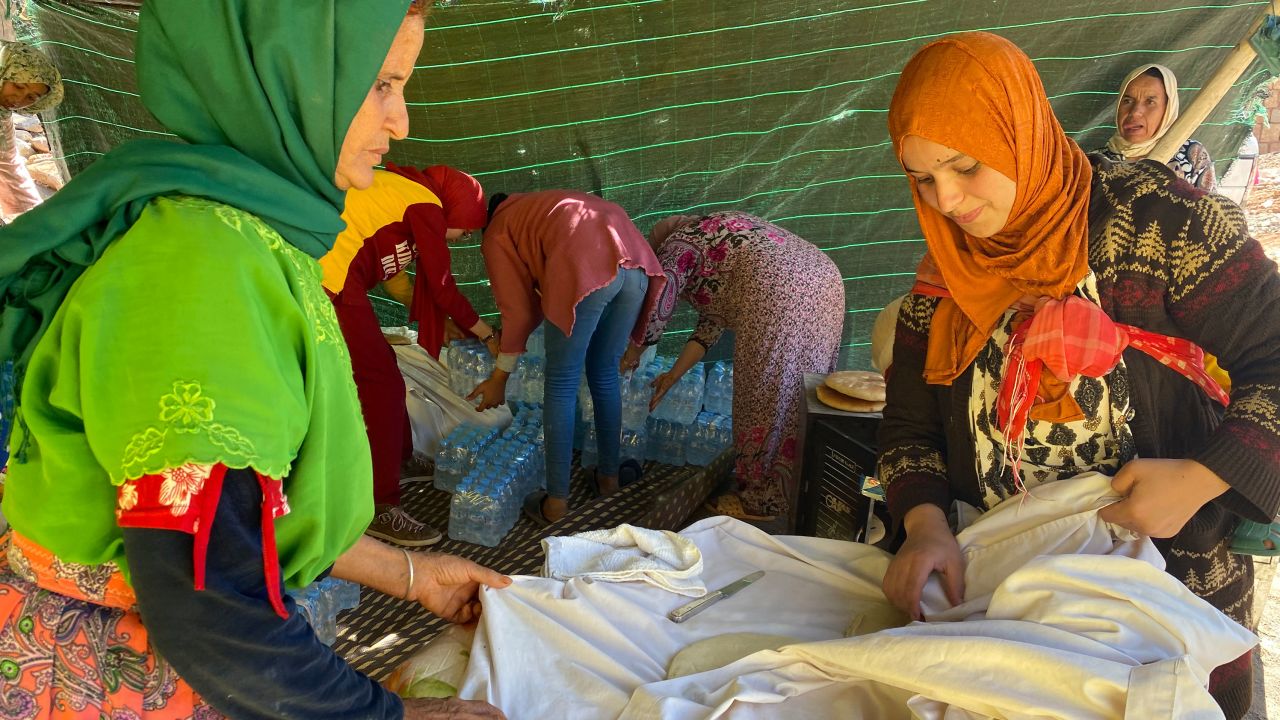Moulay Brahim was once a happy place for Sami Sensis. The village is located high in the Moroccan Atlas Mountains, and its scenery, the fresh air, the friendly people drew his parents there nearly every summer.
Now they are buried somewhere under the rubble of their hotel on the edge of what remains of the village.
The building partially collapsed after a powerful earthquake struck Moulay Brahim late on Friday night. The epicentre of the 6.8-magnitude earthquake was not far from the village that lies about two hours southwest of Marrakech.
The quake, the strongest to hit Morocco in more than 120 years, killed more than 2,000 people. Many others remain missing.
Local officials told CNN that 25 people were killed in the village. Three people – including Sensis’ mother and father – were still missing as of Sunday afternoon.
Sensis, 39, was getting increasingly desperate and frustrated. “I cannot even bury them. I can’t see them, I don’t know where they are,” he said as his voice cracked with emotion and anger.
His phone has not stopped ringing for two days. Relatives and friends keep calling, constantly asking him for updates. But he doesn’t have any news to share. The site has become too unstable and dangerous and the local fire brigade has ordered residents out of the area, halting the search for those missing.
“Nothing is happening. We are just waiting. They decided to do nothing. They are just telling us to be patient, making promises,” Sensis said, adding that he also tried to go inside the collapsed building to search for his parents.
The hotel’s owner, Idsaleh Mahjoub, confirmed to CNN that Sensis’ parents were at the hotel when the quake hit. Their names were on his register, and he recognized them in photos Sensis showed him.
Locals have managed to pull six people out of the hotel’s rubble, all of them alive, Mahjoub said.
“But the others, we were not able to do anything,” he said. “We went to inform the governor about those that were trapped and every time he tells us that they will come and take them out. Today they came to scout the area, and then left to grab their equipment.”
Morocco’s Interior Ministry said Sunday that after assessing the needs, it decided to respond to offers of help from several foreign governments, including “Spain, Qatar, the United Kingdom and the United Arab Emirates, which suggested mobilizing a group of search and rescue teams.”
Impassable roads
Like many other villages in the area, Moulay Brahim is hard to get to. The roads are narrow and windy, and some are partially obstructed by huge boulders that rolled down the steep hills during the earthquake.
Further up the mountains, some roads remain completely impassable, even 48 hours after the earthquake, according to the authorities.
The difficult access to the vast earthquake-hit area has hampered aid delivery efforts. While emergency camps have been set up in some places, people in other inaccessible areas have been left to fend for themselves.
In a village not far from the town of Asni, further up from Moulay Brahim, the first official government aid arrived on Sunday morning. In this settlement of 2,000, almost everyone has lost their home.
Dozens of bright yellow tents now provide shelter to people whose houses were rendered uninhabitable in the quake.

The tents provided little relief from the hot afternoon sun on Sunday.
But the heat did little to stop Leila Idabdelah. With her baby strapped to her back, Idabdelah was making khobz – a traditional Moroccan flatbread – to feed those affected.
Not being able to rely on official help, the locals have self-organized and are sharing resources. Idabdelah oversaw the bread oven and had made several dozen loafs since the morning.
Idabdelah told CNN she and her family of five were asleep when the quake hit on Friday. When they scrambled to their feet and tried to run outside, they realized that the violent shaking had damaged their house and jammed the door and windows.
“Our neighbors saved us. They came and freed the door and helped us outside,” she said.
She told CNN she was unable to think about how long would take for her family to have a solid roof over their heads. The tents aren’t great, but they are a huge improvement compared to the first night after the earthquake, when the family slept on the floor in an open space outside.
In Moulay Brahim, there are no official tents. People are still sleeping out in the open streets or on a football field nearby.
Many are exhausted and heartbroken, and emotions are running high. At one point on Sunday afternoon, a scuffle broke out on the street not far from where Sensis was waiting to hear from the authorities.
With each passing hour, the chances of anyone being pulled out of the rubble alive are disappearing.

Late on Sunday evening, the body of Sensis’ mother was finally recovered from the rubble. His father remains missing.
Hours before, Sensis told CNN he had lost all hope his parents might still be alive. But when speaking of them, he was still referring to them in present tense.
“I can’t imagine my baby (growing up) without his grandparents, he loves them,” Sensis said. “He is always saying: “I want to go to (grandma and grandpa), I want to go to (grandma and grandpa).”“
Latest Stories
-
Baltasar Coin becomes first Ghanaian meme coin to hit DEX Screener at $100K market cap
41 minutes -
EC blames re-collation of disputed results on widespread lawlessness by party supporters
55 minutes -
Top 20 Ghanaian songs released in 2024
1 hour -
Beating Messi’s Inter Miami to MLS Cup feels amazing – Joseph Paintsil
2 hours -
NDC administration will reverse all ‘last-minute’ gov’t employee promotions – Asiedu Nketiah
2 hours -
Kudus sights ‘authority and kingship’ for elephant stool celebration
2 hours -
We’ll embrace cutting-edge technologies to address emerging healthcare needs – Prof. Antwi-Kusi
2 hours -
Nana Aba Anamoah, Cwesi Oteng special guests for Philip Nai and Friends’ charity event
2 hours -
Environmental protection officers receive training on how to tackle climate change
2 hours -
CLOGSAG vows to resist partisan appointments in Civil, Local Government Service
4 hours -
Peasant Farmers Association welcomes Mahama’s move to rename Agric Ministry
4 hours -
NDC grateful to chiefs, people of Bono Region -Asiedu Nketia
4 hours -
Ban on smoking in public: FDA engages food service establishments on compliance
4 hours -
Mahama’s administration to consider opening Ghana’s Mission in Budapest
4 hours -
GEPA commits to building robust systems that empower MSMEs
4 hours

